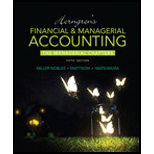
Concept explainers
Identify each item as operating (O), investing (I), financing (F), or non-cash (N).
Cash receipt from the sale of equipment
Classify the given item as operating (O), investing (I), financing (F), or non-cash (N) activities.
Explanation of Solution
Statement of cash flows: Statement of cash flows reports all the cash transactions which are responsible for inflow and outflow of cash and result of these transactions is reported as ending balance of cash at the end of reported period. Statement of cash flows includes the changes in cash balance due to operating, investing, and financing activities.
Following are three categories of cash flows shown on a statement of cash flows:
Operating activity: Operating activity refers to the cash received or cash paid in day-to-day operating activities of a company. In this direct method, cash flow from operating activities is computed by using all cash receipts and cash payments during the year.
| Cash flows from operating activities (Direct method) |
| Add: Cash receipts. |
| Cash receipt from customer |
| Dividend received |
| Interest received |
| Less: Cash payments: |
| To supplier for acquisition of inventory |
| To employees as salaries |
| For interest on loans |
| Income tax expenses and other operating expenses |
| Net cash provided from or used by operating activities |
Table (1)
Cash flows from investing activities: Investing activities refer to the activities carried out by a company for acquisition of long term assets. It includes the purchase or sale of equipment or land, or marketable securities, which is used for business operations.
| Cash flows from investing activities |
| Add: Proceeds from collection of loan made to borrowers |
| Sale of marketable securities / investments |
| Sale of property, plant and equipment |
| Proceeds from discounting notes receivables |
| Deduct: Purchase of fixed assets/long-lived assets |
| Loan made by the company to others |
| Purchase of marketable securities |
| Net cash provided from or used by investing activities |
Table (2)
Cash flows from financing activities: Financing activities refer to the activities carried out by a company to mobilize funds to carry out the business activities. It includes raising cash from long-term debt or payment of long-term debt, which is used for business operations.
| Cash flows from financing activities |
| Add: Issuance of common stock |
| Proceeds from borrowings by signing of a mortgage |
| Proceeds from sale of treasury stock |
| Proceeds from issuance of debt |
| Deduct: Payment of dividend |
| Repayment of debt |
| Interest paid |
| Redemption of debt |
| Purchase of treasury stock |
| Net cash provided from or used by financing activities |
Table (3)
Non-cash investing and financing activities: The non-cash investing and financing activities that do not involve any cash dealings are known as non-cash transactions. In these type transactions, there will not be any inflow or outflow of cash. Simply put, the transaction, which does not have an impact on the inflow or outflow of cash, is called as non-cash transaction.
Examples of non-cash transactions are stated below:
- Issue of common stock to retire long-term debt.
- Purchase of land or building by signing mortgage notes payable.
- Purchase of land and building in exchange for notes payable.
- Purchase of machinery by issuing notes payable.
- Issuance of common stock for purchase of land.
Therefore, the cash receipt from sale of equipment is classified under investing (I) activities of statement of cash flows.
Want to see more full solutions like this?
Chapter C Solutions
Horngren's Financial & Managerial Accounting, The Managerial Chapters (6th Edition)
 Managerial AccountingAccountingISBN:9781337912020Author:Carl Warren, Ph.d. Cma William B. TaylerPublisher:South-Western College PubPrinciples of Accounting Volume 1AccountingISBN:9781947172685Author:OpenStaxPublisher:OpenStax College
Managerial AccountingAccountingISBN:9781337912020Author:Carl Warren, Ph.d. Cma William B. TaylerPublisher:South-Western College PubPrinciples of Accounting Volume 1AccountingISBN:9781947172685Author:OpenStaxPublisher:OpenStax College College Accounting, Chapters 1-27AccountingISBN:9781337794756Author:HEINTZ, James A.Publisher:Cengage Learning,
College Accounting, Chapters 1-27AccountingISBN:9781337794756Author:HEINTZ, James A.Publisher:Cengage Learning, Auditing: A Risk Based-Approach (MindTap Course L...AccountingISBN:9781337619455Author:Karla M Johnstone, Audrey A. Gramling, Larry E. RittenbergPublisher:Cengage Learning
Auditing: A Risk Based-Approach (MindTap Course L...AccountingISBN:9781337619455Author:Karla M Johnstone, Audrey A. Gramling, Larry E. RittenbergPublisher:Cengage Learning





